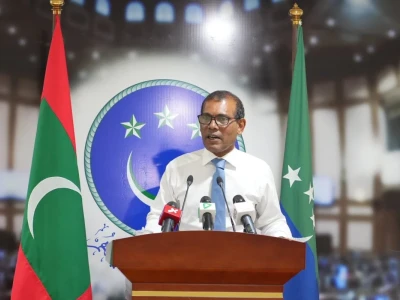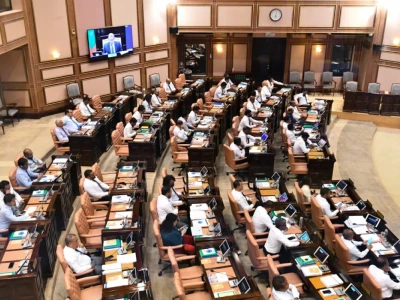
Nasheed's proposed parliamentary system: direct election for presidency
Monday's sitting was called off after the parliament failed to meet the quorum.
In a parliamentary system, the president who serves as the head of state will still be elected by a direct vote of the people, according to the proposed governance paper by speaker Mohamed Nasheed.
Parliament on Thursday sent to the Elections Commission a resolution passed at Wednesday's sitting seeking a referendum on the system of governance in Maldives by October 30.
The Elections Commission (EC) has since requested the parliament to determine and provide the question to be asked of the people in the public referendum seeking views on changing the country's governance system.
Nasheed was set to submit a proposal to the parliament on Monday to determine the wording on the ballot paper to be used in the referendum on the governance system in Maldives, as well as a paper on the proposed system of governance.
However, the sitting was called off after the parliament failed to meet the quorum.
The paper, which includes the characteristics of a parliamentary system and a presidential system, says:
-
A parliamentary system consists of a prime minister elected by a majority of the members of parliament and a president elected by direct vote of the people
-
The president is the head of state, while the prime minister is the head of government
-
Government is a parliamentary body - the prime minister forms the council of ministers or Cabinet; all members of the cabinet are members of the parliament
Fundamental characteristics of the parliamentary system proposed by Nasheed
Power of state:
-
In a parliamentary system, the executive and legislative branches of state are intertwined
-
The power of government rests with the prime minister
-
The legislative power rests with the parliament
-
Only the judicial courts have the power to administer justice
-
The head of state is the president
-
The president shall be elected by direct secret ballot without any role of parliament
-
The prime minister shall be elected by the parliament
-
The prime minister shall form the council of ministers or cabinet
-
The prime Minister and ministers are accountable to the parliament
-
The judges of the supreme court shall be appointed by the president; the judges can be removed by the parliament
-
The JSC will appoint judges to the lower courts; the judges will be removed on the recommendation of the JSC
Powers of the president:
-
To appoint the prime minister elected by the parliament to the post and accept his resignation as provided for in the constitution
-
Declaration of general election
-
Appointment of persons to the independent posts and agencies defined in the constitution in consultation with the parliament
-
The president shall be the chief of army staff in consultation with the prime minister
-
The judges of the Supreme Court shall be appointed by the president; parliament can dismiss the judges
Powers of the prime minister:
-
Only an MP who has the backing of majority members in the parliament can serve as the prime minister
-
Once parliament passes a no-confidence motion against the prime minister, ministers and government, a new government must be formed
-
If parliament passes a no-confidence motion against the prime minister, he must resign
Presidency:
-
The term of the president is five years
-
In a parliamentary system, if parliament is dissolved, the government will be dissolved
-
The term of the parliament is also five years
According to the paper, in a parliamentary system, an elected member of parliament can be removed from office by a recall vote if the people of his constituency want him to be removed from office during that term. In case of a recall vote, if the MP does not receive 50% of the votes received to be elected to parliament, he will have to resign, the paper said.
Related
Related

Most Maldivians still favour presidential system, new poll shows

Parliament to decide wording of govt system referendum ballot

Parliament adopts resolution seeking Oct system referendum

